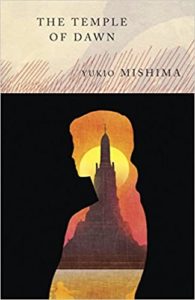The Temple of Dawn (Sea of Fertility 3)
Yukio Mishima
Shigekuni Honda, successful international business lawyer, is called to Bangkok in 1941 to settle a dispute. While engrossing himself in the study of Buddhism, in particular reincarnation, he is permitted an audience with the royal princess Chantrapa. She is the daughter of Honda’s high school classmate and insists that she belongs to Japan. When she recognizes Honda, he believes her to be a reincarnation of the revolutionary Isao whom he had defended years ago, but in the end, he must leave Thailand without proof.
They meet again 11 years later when the princess – now 18 years old and calling herself Ying Chan – comes to Japan to study. Honda is obsessed with the young woman and tries to crack her secret, but Ying Chan avoids him whenever she can, just spurring on the advances and scheming of the lawyer.
The first part of this book, set in Thailand, is heavy with Buddhist teachings that demand quite some attention. In the second part, we can focus on Honda and his desire to find out whether Ying Chan is indeed Isao’s reincarnation. Although some of Honda’s schemes are quite unsavoury, I still felt sympathy for him overall. I feel that Mishima is at his best when describing land- and cityscapes, and I loved the images of Bangkok he could conjure up in my mind’s eye. This is probably the reason why I liked this book more than the “Runaway Horses”, and I myself got very curious about this whole reincarnation business…
This is the third book in Mishima’s “Sea of Fertility” cycle, and it centres on Honda, who has hitherto been a mere side character. There were so many references to Isao, the protagonist of the second book, that it would be hard to follow without having read “Runaway Horses”.
Yukio Mishima is regarded as one of Japan’s foremost authors of the 20th century. A weak child, he took up bodybuilding and kendo when he was older and became very fit. He started writing early and eventually became the protégé of Yasunari Kawabata, the first Japanese winner of the Nobel Prize for Literature. Besides his numerous books, he also wrote plays for Noh and Kabuki, as well as for contemporary theatre. He was 45 when he committed ritual suicide.
If you’re interested in a deep dive into Buddhism and the practice (or art?) of reincarnation, you can get this book at amazon.

